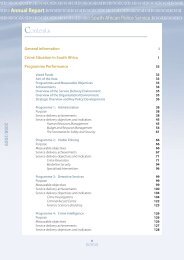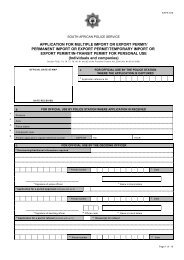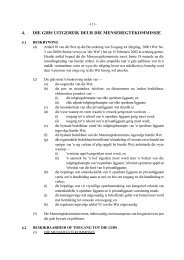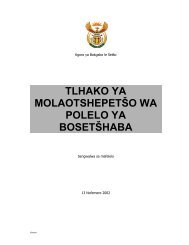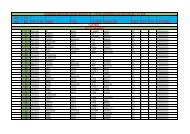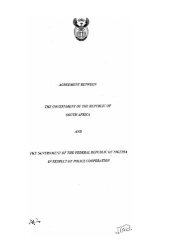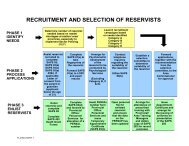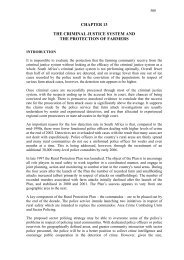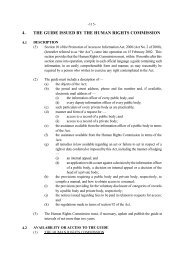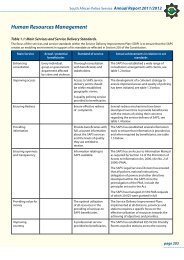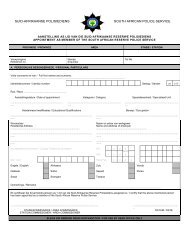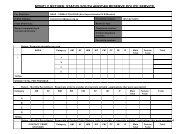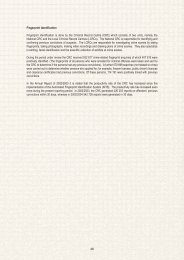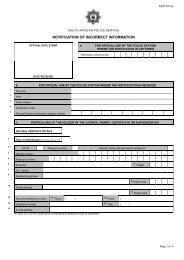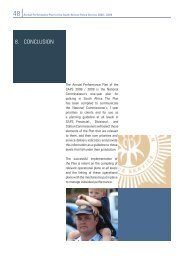Untitled - Saps
Untitled - Saps
Untitled - Saps
Create successful ePaper yourself
Turn your PDF publications into a flip-book with our unique Google optimized e-Paper software.
2001<br />
10 Years of Policing in a Democracy 1995 – 2005<br />
38<br />
• To stem the tide of brutal slayings of police officials, the SAPS established a Police Safety<br />
Directorate in April 2001. The aim of the directorate was to develop measures to prevent<br />
attacks on police officials.<br />
• The SAPS developed and implemented a strategy to improve the reliability of crime<br />
statistics. Various initiatives in this regard were implemented and police members<br />
throughout the country were trained in using the computerized Crime Analysis System.<br />
The SAPS trained some 3 000 members to classify crime and to capture data correctly.<br />
• A hi-tech, mobile X-ray unit to help in the fight against crime was introduced in North<br />
Rand. The SAPS identified a need for a machine that could enhance their crimedetection<br />
capabilities. Hi-tech computers and other systems were consequently installed<br />
in a marked vehicle that could be deployed anywhere. This technology greatly speeds up<br />
police searches of, for instance, containers of any kind without having to break seals.<br />
• In May 2001, a multinational police task team destroyed 108 hectares of cannabis in<br />
Swaziland.<br />
• The Rapid Deployment Stability Force was established late in 2001 for deployment<br />
in all provinces. This force was deployed in support of local police in flashpoint areas<br />
in instances where normal policing was not adequate to deal with incidents of public<br />
disorder, serious and violent crimes and disaster management. The SANDF and 43<br />
SAPS intervention units supported the Rapid Deployment Stability Force.<br />
• Air-supported reaction forces were first established in Gauteng and were later extended<br />
to the Western Cape, KwaZulu-Natal and the Eastern Cape. These units acted as quickresponse<br />
units to incidents of serious and violent crime such as bank robberies, vehicle<br />
hijackings and farm attacks. Air support could also be used for aerial surveillance.<br />
• A satellite tracking system was installed in all SAPS aircraft to enhance their capacity to<br />
deal with the theft and hijacking of vehicles.<br />
• Two additional helicopters were purchased at a cost of R25 million to strengthen the airsupport<br />
capacity of the SAPS. Two more helicopters were ordered.<br />
• The then Minister for Safety and Security, Mr Steve Tshwete, in cooperation with<br />
National Police Commissioner, Jackie Selebi, launched a national campaign in<br />
Katlehong, Gauteng on 2 April 2001, encouraging members of the public to reject and<br />
report stolen goods.<br />
• The Saambou Bank Community Policing Competition gave recognition and rewards<br />
to police stations and police units whose progress was commendable. The primary<br />
aim of the competition, since its inception, was to contribute to the institutionalization<br />
of community policing. The 2000/2001 competition focused on the assessment of<br />
endeavours aimed at improving quality of service, police-community relations and<br />
projects aimed at enhancing the safety and security of communities.<br />
• The SAPS received a grant of R3 million from France to speed up future operations. A<br />
part of the money was earmarked for the computerization of SAPS criminal records.<br />
• Specialized units in Gauteng were restructured in order to ensure organized, integrated<br />
functioning. Specialized detective units were also phased out to strengthen detective<br />
services at police stations.<br />
• Canine police members Orca and Prins left with their handlers for Gujarat, India, where<br />
as many as 100 000 people were believed to have died as a result of an earthquake, to<br />
participate in the rescue operations.<br />
• The SAPS launched a new Crime Stop share-call line (086 000 10111). The SAPS,<br />
through Crime Stop, involved the community in the active fight against crime without<br />
subjecting them to the dangers of apprehending criminals or suspects.<br />
• The Captain Crime Stop campaign targeted nursery school children between the ages of



